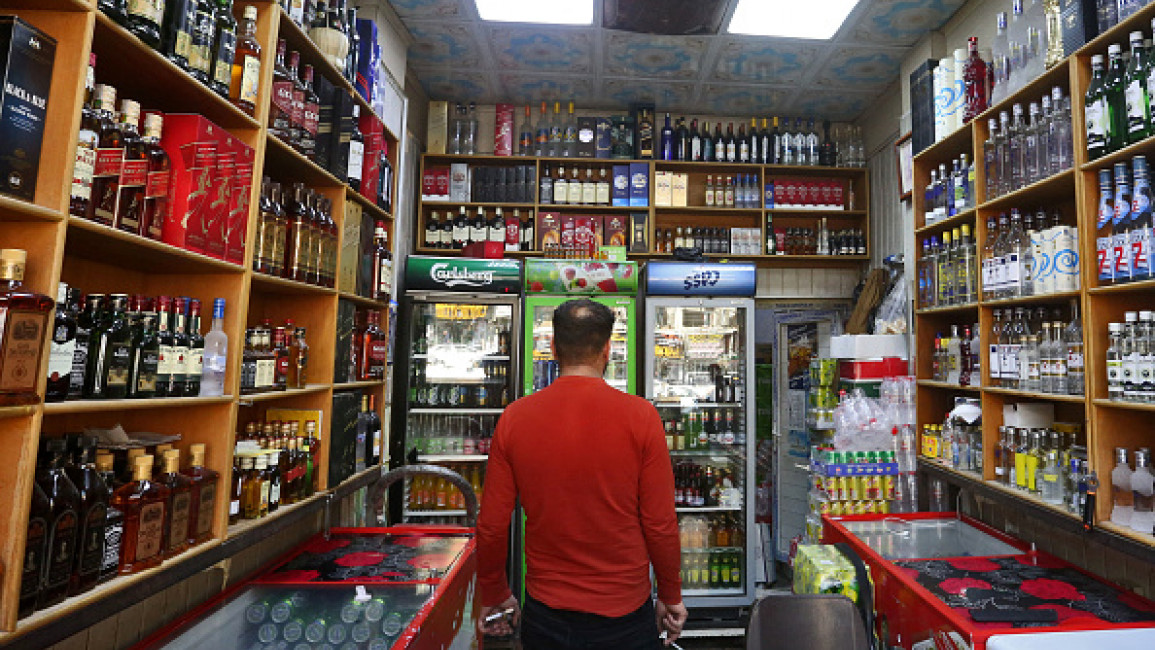Alcohol ban in Iraq causes public anger, worry over spike in drug use
A recent government decision to ban alcohol in Iraq has sparked controversy in the Muslim-majority country, with many arguing that the move goes against Iraq’s pluralism.
Approved by the Iraqi parliament in 2016, the law was only published in the country’s official gazette on Wednesday, making it effectively.
Article 14 of the law stipulates a ban on the import, production or sale of alcoholic beverages of all kinds in Iraq. The article’s second paragraph says those who violate the law can face fines between 10 and 25 million Iraqi Dinars, roughly between $6,800 and $17,100 according to the official market rate.
The move has caused a debate, as some have said it does not take into consideration the non-Muslim minority in the country who can consume alcohol.
Christian parliamentarian Farouk Hanna Atto said the law contradicted the principle of individual freedoms and the very foundations of the Iraqi constitution, "which emphasised respect for freedoms and democracy."
He said the law hadn’t been enforced for about six years after passing through parliament due to its sensitivity.
"Iraq is a country characterised by religious, nationalistic and sectarian pluralism, and this type of law cannot be imposed on everyone, because there are those who consume alcohol, while these drinks are prohibited for others and represent a red line for them," he told local media.
"But all orientations, opinions, religions and sects must be respected," he added.
The lawmaker said the ban could push youth to resorting to other substances such as drugs, constituting a bigger threat to Iraqi society.
Several Twitter users echoed Atto’s claims that the ban could encourage the use of drugs.
حظر استيراد وبيع وتصنيع المشروبات الكحولية.
— Hamzah Alhardan - حمزة الحردان (@Alhardanirq) February 23, 2023
هكذا قوانين لاتتناسب مع التنوع الديني والفكري في العراق وهي محاولات لتأسيس دولة على غرار دولة خرافة البغدادي!.
قرارات سوف تنعكس سلبًا على المشرع والمجتمع، لان الدستور كفل الحريات العامة والمدنية.
انتم تدعمون انتشار المخدرات لا أكثر! pic.twitter.com/ERnHFnsfXU
"Such laws are not commensurate with the religious and intellectual diversity in Iraq, and they are attempts to establish a state similar to the state of Al-Baghdadi's myth!" wrote political and economic analyst Hamza Al-Hardan, in reference to the former Islamic State group leader.
"Decisions that will reflect negatively on the legislator and society, because the constitution guarantees public and civil liberties. You support the spread of drugs no more!" he added.
اني شخص ميشرب كحول نهائيا
— 𒀠𒄿-عـلي (@AliAl3obaaidi) February 23, 2023
بس منع استيراد وتصنيع الكحول بقانون شي جدا خطر
اولا عدنا مصانع للبيرة والويكسي رح تتوقف واصحابها رح يخسرون مليارات منو يعوضهم؟
منع الكحول يعني الاتجاه للمخدرات واكو تجارب واقعية وحية بمناطق من العراق
لازم يصير طعن بهاي المادة الي ماعرف شون مرروها
One Twitter user wrote: "I don’t drink alcohol, but banning the import and manufacturing of alcohol is very dangerous. First of all we have breweries that make beer and whiskey and they’re going to close and their owners will lose billions, who will compensate them?"
"Banning alcohol will lead to [taking] drugs, and there are real cases like these in Iraq. This article must be appealed, I don’t understand how it was even passed."
معقولة
— الكرخي (@M196414) February 23, 2023
البلد بي مشاكل قيامة واجه على بالكم تمنعون الكحول استيراد وتصنيع زين ما فكرتو ان العراق متعدد الديانات وسفارات وشركات اجنبية ولو المسلمين يشربون اكثر من غيرهم
والشرب من ضمن الحريات الشخصية
ولو هي واضحة تريدون تمشون مخدرات الجارة pic.twitter.com/1hSkQVbUws
Another person wrote: "Really. The country has so many problems and all you care about is banning alcohol. Did you not think that Iraq is religiously diverse and has embassies and foreign companies."
"Muslims drink more than others. And drinking falls within individual freedoms," accusing the government of wanting to get into drugs trade.
The number of Christians and other non-Muslim minorities has dwindled in Iraq over the decades due to conflict and instability, persecution by the Islamic State group, and economic crises.
Unofficial numbers in the Middle Eastern country of 43.5 million puts Muslim Shias and Sunnis at over 95 percent. The rest are Christians, Yazidis, Zoroastrians, Bahai’s and others.



